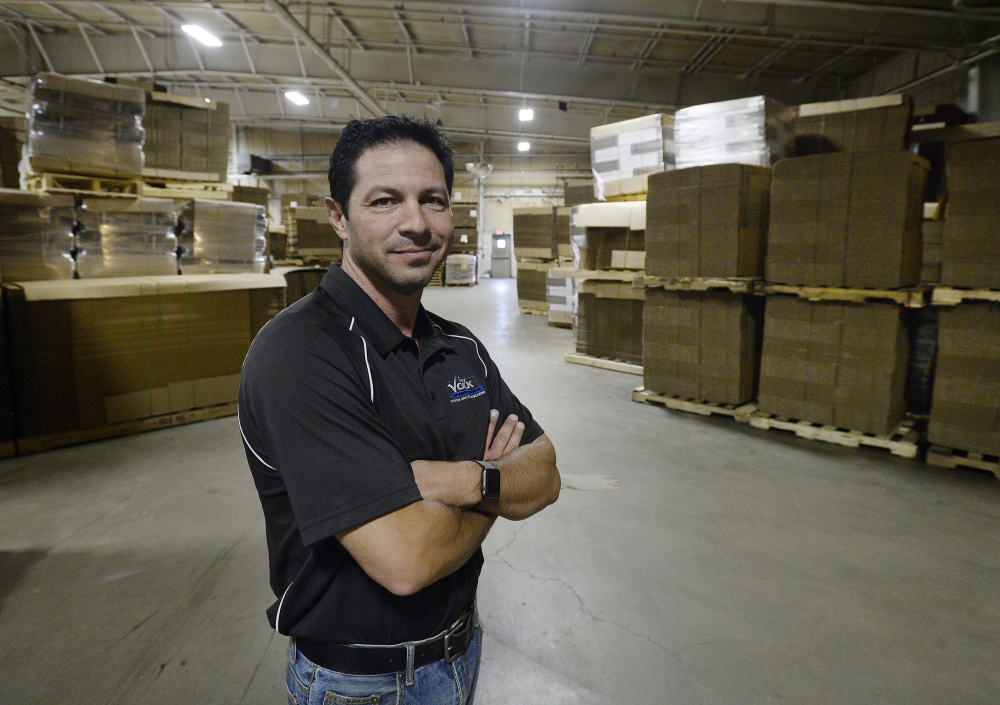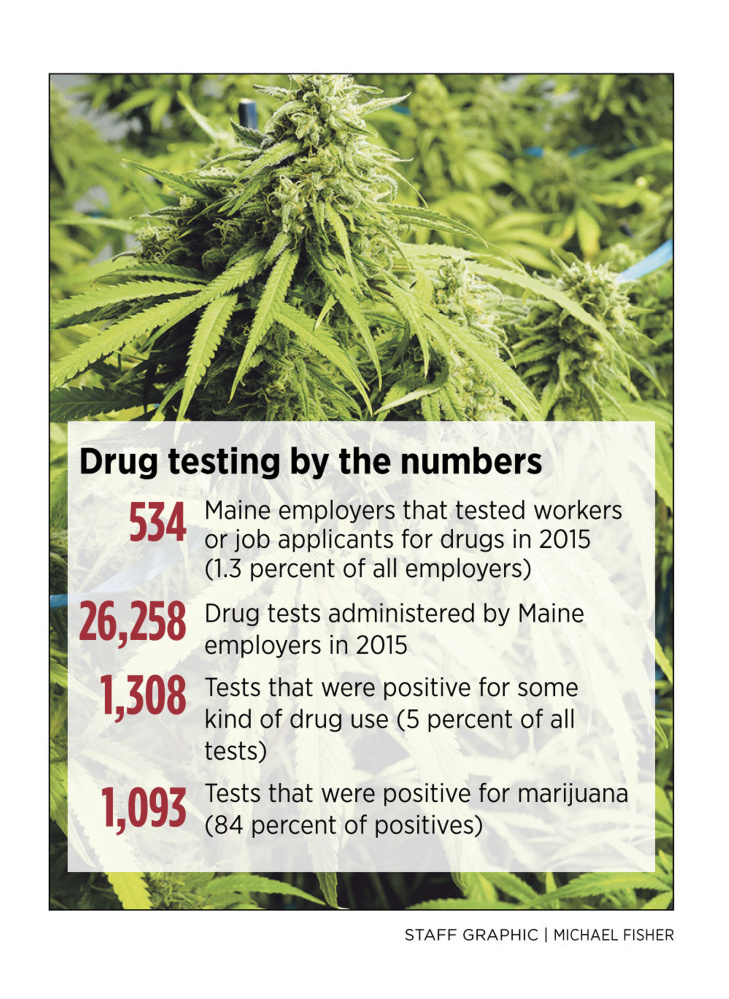The difficulty of testing for marijuana intoxication and the complexity of Maine’s drug-testing laws are creating uncertainty among state officials and employers about the workplace impacts of a legal marijuana market.
“It’s uncharted territory to a great extent,” said Julie Rabinowitz, director of policy, operations and communications for the Maine Department of Labor.
As Maine residents prepare to vote on marijuana legalization Nov. 8, state labor officials are meeting with their counterparts in Colorado and preparing to answer questions from employers about how passage of Question 1 would affect their drug-testing policies and efforts to maintain a drug-free workplace. State labor officials plan to offer courses on how to spot impairment in the workplace, and they say it’s unclear whether employers will be able to continue screening prospective workers for marijuana use.
However, backers of the legalization measure say the proposed law leaves in place protections for employers, who would still be able to implement drug-screening requirements, maintain drug-free workplace policies and fire employees who show up for work intoxicated.
No state east of the Rockies has legalized marijuana, but Maine and Massachusetts – as well as Arizona, California and Nevada – will vote Nov. 8 on proposals to establish recreational cannabis markets. Colorado, Washington, Oregon, Alaska and the District of Columbia have all legalized marijuana for adult use.
While Maine already has higher marijuana use rates than most other states and is home to a burgeoning medical marijuana program, the potential increase in access to the drug raises questions for employers about how it would affect workplaces.
Although Maine employers will still have the right to prohibit employees from working while impaired – whether it’s by alcohol, marijuana or other drugs – there is no agreed-upon testing standard for marijuana impairment. Unlike a positive test for alcohol in the bloodstream, a positive test for marijuana doesn’t prove impairment because it could be the result of cannabis use weeks before the test.
And the referendum raises doubts about whether employers will continue to be able to reject job applicants who test positive for marijuana use that is no longer against the law, according to the Department of Labor.
The department has sought guidance from Colorado about how a recreational market could affect employers that drug-test employees or maintain drug-free workplace policies, and labor officials are still sorting through the Maine initiative and how it interacts with existing state law related to drug testing. Employers, meanwhile, say they are taking a wait-and-see approach as they look for guidance from state officials on how to deal with employees who show up for work stoned.
“Right now you can choose not to hire if an applicant tests positive for marijuana. If (Question 1) passes, we have to look at whether there is a conflict with existing laws in Maine,” Rabinowitz said. “It’s not clear if they would be able to not hire because of a positive test. There’s no cut-and-dried answer right now.”
EMPLOYERS’ RIGHTS MAINTAINED
The Marijuana Legalization Act proposes to regulate marijuana like alcohol in Maine. Adults 21 and older would be allowed to possess up to 2½ ounces of cannabis, grow their own plants and buy marijuana from licensed retail stores. The proposal also allows marijuana social clubs in municipalities that approve them and places a 10 percent tax on marijuana sales.
Proponents of legalization say a regulated market will help keep marijuana away from children, allow law enforcement to focus on more serious crimes and stop otherwise law-abiding adults from coming into contact with the criminal justice system. Opponents – including Gov. Paul LePage and top law enforcement and public health officials – raise concerns about youth access, impaired driving and the wisdom of legalizing marijuana while the state is in the midst of an opiate epidemic.
A majority of Maine voters favor legalizing marijuana for recreational use, according to a new Portland Press Herald/Maine Sunday Telegram poll. Half of respondents indicated they support Question 1, while 41 percent said they oppose it. Nine percent of respondents said they were undecided. More than 60 percent of poll participants reported having tried marijuana at some point in their lives.
The ballot initiative does not require employers to allow the use of marijuana in the workplace or prohibit them from disciplining employees who are under the influence, said Alysia Melnick, policy director for the Campaign to Regulate Marijuana Like Alcohol.
“Question 1 doesn’t change Maine employers’ rights to keep and maintain a drug-free workplace,” Melnick said. “Maine is and will continue to be an at-will state, meaning employers can terminate employees for just about any reason. If an employer had concerns about an employee’s performance or an employee was impaired on the job, they would continue to be within their rights to terminate that employee.”
Melnick said the initiative says that employers cannot discriminate against employees who use marijuana, but that doesn’t mean they have to hire them if they can’t pass a drug test.
“If someone is not performing their job well or seems impaired or is doing anything else that would cause an employer to fire them, they’d still be allowed to let them go,” she said. “What they can’t do is fire someone solely on their use of marijuana outside of the workplace.”
WALKING A FINE LINE
Even if passage of the referendum would not prohibit pre-employment drug screening, employers may find themselves walking a fine line between respecting employees’ rights to do what they want on their own time and a desire to maintain a work environment free of people using marijuana, according to labor experts. That could leave employers in the uncomfortable position of trying to decide between tightening policies on positive test results to keep users out of the workplace or loosening them to avoid losing qualified employees.
That becomes tricky, according to labor officials and employers, because it can be more difficult to assess impairment from marijuana use than from the use of other substances, such as alcohol or opiates. A positive marijuana test indicates only that someone has consumed in recent weeks, not whether he or she is actually impaired in the workplace.
With alcohol, a breath test can be used to determine if someone is above the 0.08 percent blood-alcohol content that is considered the threshold for impairment. But there is no agreed-upon blood-content level for tetrahydrocannabinol – or THC, the psychoactive ingredient in marijuana – that would determine impairment. THC can stay in a person’s system for weeks after consumption, and regular marijuana users could have high THC levels but not be impaired.
Given that state law now prohibits recreational marijuana use, some employers have considered any positive test a reason not to hire a job candidate. But if recreational marijuana use becomes legal, drug screening gets complicated.
“Human resources officials are still in two modes: catch-up and reaction,” said Jim Reidy, a New Hampshire attorney who specializes in labor and employment law and is a member of the Society for Human Resource Management. “We’re in an interesting time when there’s a culture clash between individual rights and the rights of an employer to govern its rules of conduct and its expectation with regards to employees. We’re in a culture war between individual rights and the rights of the employers.”
DRUG TESTING AND IMPAIRMENT
At Volk Packaging Corp. in Biddeford, prospective employees must pass a pre-employment drug screening, regardless of whether they will be operating heavy machinery or working in the office.
“We don’t want anyone hurt and we don’t want anyone stoned,” said Derek Volk, the company’s president. “What they do on the weekend, if it’s legal, there’s nothing I can do about that. We need to make sure we don’t have impaired people out in the workplace being a danger to themselves or someone else.”
Volk doesn’t expect the company will change its drug-testing policy if marijuana is legalized, but he is worried about what would happen if an employee showed up for work after consuming marijuana.
“How do you determine if someone is impaired or not impaired? Somebody could have recreationally smoked pot two weeks ago and they show up for work and fail a drug test,” he said. “We’re trying to learn what the law exactly would say and what our abilities would be based on someone failing a drug test. I don’t see us getting rid of pre-screening, but I don’t know how we determine a potential employee’s opportunity here if we find out they’re a recreational drug user.”
Maine labor laws allow employers to drug-test employees with approval from the state Department of Labor, but the regulations around testing are complex and exclude most Maine employers from implementing random testing policies. The number of Maine companies that drug-test employees is surprisingly low, even though the numbers have increased over the past decade, Rabinowitz said.
Of the state’s roughly 40,000 employers, about 500 do some form of drug testing, including pre- and post-hiring tests. There are fewer than 200 companies that do random drug tests of employees. That number is especially low because companies with fewer than 50 employees are not allowed to randomly test employees. Some companies – particularly those that employ commercial truck drivers or federal contractors – are required by federal law to drug-test employees.
In 2015, the state recorded the highest percentage of positive drug tests since regulated testing began in 1989. Last year, a total of 26,258 tests were administered, with 5 percent – or 1,308 tests – coming back positive. A total of 1,093 of those tests, or 84.1 percent, were positive for cannabinoids, according to the Department of Labor.
While more than 500 companies do some form of drug testing, that doesn’t necessarily help when it comes to determining if an employee is impaired by marijuana while on the job, Rabinowitz said.
“If you are smoking marijuana and test positive, but you smoked it recreationally on the weekend, how do I differentiate that from someone who smoked that morning and came to work high? It becomes a critical issue if marijuana is legalized recreationally,” Rabinowitz said. “It becomes a real difficult standard for an employer to enforce.”
In addition to classes on spotting impairment in the workplace, the Department of Labor is adding more information online about the state’s drug-testing regulations and working on revising model drug-testing policies that are compliant with state law.
“The department is not taking a position on the referendum, but looking at complicating factors for employers and employees if it passes,” Rabinowitz said.
‘WE’RE ALL WAITING FOR GUIDANCE’
Colorado’s experience with marijuana in the workplace appears to indicate Maine has little reason for concern.
After Colorado became the first state to legalize recreational marijuana in 2012 and commercial sales began in 2014, nothing changed in terms of employer rights with drug testing, said Andrew Freedman, director of marijuana coordination for the state. Employers can still drug-test employees and put in place drug-free workplace policies.
In 2015, the Colorado Supreme Court affirmed a lower court ruling that businesses can fire employees for the use of marijuana, even if it’s while they’re off duty.
Freedman said he is not aware of any widespread concerns about drug testing in Colorado.
He said about 13 percent of adults use marijuana, which is roughly the same as before legalization, suggesting there is no greater risk of workers being high while on the job. At the same time, however, he also has heard comments from employers that it is now harder to hire people around the age of 25 because they can’t pass a drug test.
Freedman said retaining employees hasn’t been as much of a problem, indicating that people are abstaining from marijuana use if it’s a job requirement.
As five states prepare to vote on marijuana legalization, Freedman’s office has been busy fielding requests for information about the impact of legalization from officials in other states, including Maine. He suggested that if legalization is approved in Maine, the state could launch a public education campaign around marijuana use and employment. He said it should emphasize how long marijuana can stay in a person’s body and that testing positive could affect employment opportunities.
Maine labor officials said they have looked to Colorado’s experience and contacted officials there for advice. But, they said, there are important differences between labor and employment laws in the two states and that Maine could run into problems not experienced out West. Colorado doesn’t have the same limitations around drug testing that exist in Maine, for example, and it does not require employers to report to the state if they drug-test employees or job applicants.
Don Brewer, human resources director for the city of South Portland, said he knows there will be new challenges for employers if Question 1 passes Nov. 8.
Currently, the city does pre-employment drug screenings of all applicants selected for a job. Employees who hold a commercial driver’s license – usually in the public works, parks or water resource protection departments – are mandated by federal law to undergo pre-employment screenings and random drug tests, something that will not change because marijuana is illegal under federal law. City officials are waiting for direction from the state on how to handle the challenges that pop up, Brewer said.
“If it’s legal, (employees) still have to be able to perform their job duties while not impaired. It’s important we maintain a safe workplace,” Brewer said. “There are going to be a lot of questions, what-abouts and what-ifs. We’re all waiting for guidance on how to manage employees if marijuana is legal.”
Send questions/comments to the editors.






Comments are no longer available on this story